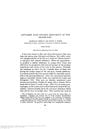1 citations,
August 2012 in “Pediatrics in review” Not getting enough vitamin D can lead to health problems, so kids over one should get 600 IU/day.
September 2022 in “Ukraïnsʹkij naukovo-medičnij molodìžnij žurnal” Quality pharmaceutical care is crucial for safe and effective use of vitamin-mineral supplements during pregnancy and breastfeeding.
 June 2024 in “Archives of dermatological research”
June 2024 in “Archives of dermatological research” Dietary supplements might help prevent post-COVID hair loss, but serum ferritin is not a reliable indicator.
 12 citations,
September 2022 in “Foods”
12 citations,
September 2022 in “Foods” Some nutraceuticals may help in COVID-19 prevention and treatment, but more research is needed.
 July 2024 in “Brazilian Journal of Clinical Medicine and Review”
July 2024 in “Brazilian Journal of Clinical Medicine and Review” Hair loss after bariatric surgery is common due to nutrient deficiencies and rapid weight loss.
 August 2024 in “IAHS Medical Journal”
August 2024 in “IAHS Medical Journal” Low vitamin D and ferritin levels are linked to female hair loss.
 13 citations,
December 1940 in “The journal of nutrition/The Journal of nutrition”
13 citations,
December 1940 in “The journal of nutrition/The Journal of nutrition” Lack of certain vitamins causes fur loss and greying in silver foxes.
June 2021 in “International journal of cosmetics and dermatology” Vitamin C and E may help with certain skin and hair conditions, but more research is needed to confirm their effectiveness.
 January 2019 in “Kocaeli tıp dergisi”
January 2019 in “Kocaeli tıp dergisi” People with chronic hair loss may have a higher chance of Vitamin B12 deficiency.
 January 2012 in “Vitamins & trace elements”
January 2012 in “Vitamins & trace elements” Smoking and drinking can lower vitamin levels and potentially trigger early hair loss, but overall vitamin levels don't seem to affect hair loss duration.
 1 citations,
February 2023 in “Digestive diseases and sciences”
1 citations,
February 2023 in “Digestive diseases and sciences” Gastroparesis may cause hair loss due to micronutrient deficiencies, and multivitamins might help.
 79 citations,
January 2017 in “Dermatology practical & conceptual”
79 citations,
January 2017 in “Dermatology practical & conceptual” Correcting nutrient deficiencies may help with hair loss, but the benefits of supplements without a deficiency are uncertain and could be harmful.
7 citations,
July 2021 in “PubMed” Vitamins A, B, C, and D are important for skin health and are being explored for new uses, but more research is needed to confirm their effectiveness.
5 citations,
October 2021 in “Clinical, cosmetic and investigational dermatology” Japanese patients with alopecia areata often have a higher BMI and consume more vitamin C, fruit, and retinol, which may affect their condition's development or severity.
 July 2018 in “International journal of clinical & experimental dermatology”
July 2018 in “International journal of clinical & experimental dermatology” Eat a balanced diet for healthy hair; only use supplements if you have a proven nutrient deficiency.
 5 citations,
December 1942 in “Journal of the American Medical Association”
5 citations,
December 1942 in “Journal of the American Medical Association” Choline and biotin are important for liver health and preventing certain deficiencies in animals, and more research is needed to understand their benefits in humans.
 4 citations,
March 2023 in “Journal of medical case reports”
4 citations,
March 2023 in “Journal of medical case reports” Taking too much vitamin E caused a young man's blood clotting problems, which improved after he stopped the vitamin E and got treatment.
 January 2024 in “Biomedical journal of scientific & technical research”
January 2024 in “Biomedical journal of scientific & technical research” Vitamins A, B7, C, D, and E are essential for healthy hair growth and preventing damage.
 December 2020 in “International journal of research in ayurveda and pharmacy”
December 2020 in “International journal of research in ayurveda and pharmacy” Eating well and avoiding synthetic hair products are key for healthy hair.
 September 2005 in “Journal of Investigative Dermatology”
September 2005 in “Journal of Investigative Dermatology” Ferulic acid helps stabilize vitamins C and E for better skin protection from the sun, certain compounds may promote hair growth, atopic dermatitis patients have lower skin defense molecules, older men are more likely to get a type of skin cancer, and a substance called relaxin may prevent age-related skin thickening.
 36 citations,
May 2021 in “Nutrients”
36 citations,
May 2021 in “Nutrients” Natural molecules like inositols, resveratrol, vitamins, and omega-3 fatty acids may help manage Polycystic Ovary Syndrome (PCOS), but their effects vary and need more exploration.
 16 citations,
November 2020 in “PLOS ONE”
16 citations,
November 2020 in “PLOS ONE” Your lifestyle and health can affect your chances of getting COVID-19; not enough sleep, lots of exercise, and hair loss can increase risk, while washing hands, eating fruit daily, and taking vitamins A and C can lower it.
 7 citations,
May 2016 in “SpringerPlus”
7 citations,
May 2016 in “SpringerPlus” Some breast cancer patients on hormone therapy experience hair loss, and treatments like certain topical inhibitors and supplements may help without harming their cancer prognosis.
 4 citations,
November 2020 in “BMC Dermatology”
4 citations,
November 2020 in “BMC Dermatology” Researchers identified genes in scalp hair follicles that may affect hair traits and hair loss.
 4 citations,
March 2006 in “Journal of renal nutrition”
4 citations,
March 2006 in “Journal of renal nutrition” Dialysis patients benefit from water-soluble vitamins but need careful management to avoid risks.
 3 citations,
January 2000
3 citations,
January 2000 Some alternative therapies for vitiligo show promise but need more research.

The document concludes that hair loss in women is complex, often linked to aging, health conditions, and nutritional deficiencies, and emotional impacts should not be underestimated.
 239 citations,
July 2002 in “Clinical and Experimental Dermatology”
239 citations,
July 2002 in “Clinical and Experimental Dermatology” Low iron and L-lysine levels can cause hair loss in women, and increasing these nutrients can reduce hair shedding.
 98 citations,
October 2012 in “Dermatologic Clinics”
98 citations,
October 2012 in “Dermatologic Clinics” Eating the right nutrients can improve hair health, but taking extra supplements usually doesn't help unless you have a deficiency.
 August 2022 in “Journal of the American Academy of Dermatology”
August 2022 in “Journal of the American Academy of Dermatology” The authors agree they didn't discuss the risks of too much micronutrients and value the focus on biotin deficiency signs and treatment effectiveness.
























